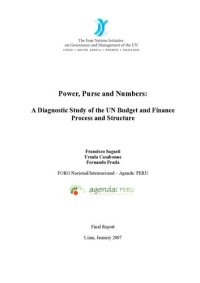
Ebook: Power, Purse and Numbers: A Diagnostic Study of the UN Budget and Finance Process and Structure. Final Report
- Genre: Other Social Sciences // Politics: International Relations
- Tags: Peru
- Year: 2007
- Publisher: FORO Nacional Internacional
- City: Lima
- Language: English
- pdf
Who should hold power in a democratic institution? The majority of its members or those
who pay for it? Is it possible to avoid the dilemma of choosing between the tyranny of
numbers and the tyranny of the purse? Can a sensible middle course be found to address the
legitimate concerns of poorer members, whose power lies in numbers, and of richer
members, whose power within the organization is based on money? These are difficult
questions that have bedevilled democratic institutions since time immemorial —and none
more so than the United Nations, which has had to deal with these issues head on during its
more than six decades of existence. Over time, these questions have been resolved, to a lesser
or greater degree, and to the satisfaction or dismay of one or another group of UN member
countries. Yet, it is highly unlikely that they will be dealt with, once and for all, in ways that
will make all of its members comfortable and happy.
The evolution of the UN has mirrored the state of the world during the second half of the
20th century. As the world economy has grown, as new states emerged in the international
arena and as conflicts multiplied, the UN was called on to address new and more complex
problems. However, its governance, management and financial capabilities remained rather
inadequate, for they lagged by several years, if not decades, behind the challenges they were
supposed to meet.
who pay for it? Is it possible to avoid the dilemma of choosing between the tyranny of
numbers and the tyranny of the purse? Can a sensible middle course be found to address the
legitimate concerns of poorer members, whose power lies in numbers, and of richer
members, whose power within the organization is based on money? These are difficult
questions that have bedevilled democratic institutions since time immemorial —and none
more so than the United Nations, which has had to deal with these issues head on during its
more than six decades of existence. Over time, these questions have been resolved, to a lesser
or greater degree, and to the satisfaction or dismay of one or another group of UN member
countries. Yet, it is highly unlikely that they will be dealt with, once and for all, in ways that
will make all of its members comfortable and happy.
The evolution of the UN has mirrored the state of the world during the second half of the
20th century. As the world economy has grown, as new states emerged in the international
arena and as conflicts multiplied, the UN was called on to address new and more complex
problems. However, its governance, management and financial capabilities remained rather
inadequate, for they lagged by several years, if not decades, behind the challenges they were
supposed to meet.
Download the book Power, Purse and Numbers: A Diagnostic Study of the UN Budget and Finance Process and Structure. Final Report for free or read online
Continue reading on any device:

Last viewed books
Related books
{related-news}
Comments (0)